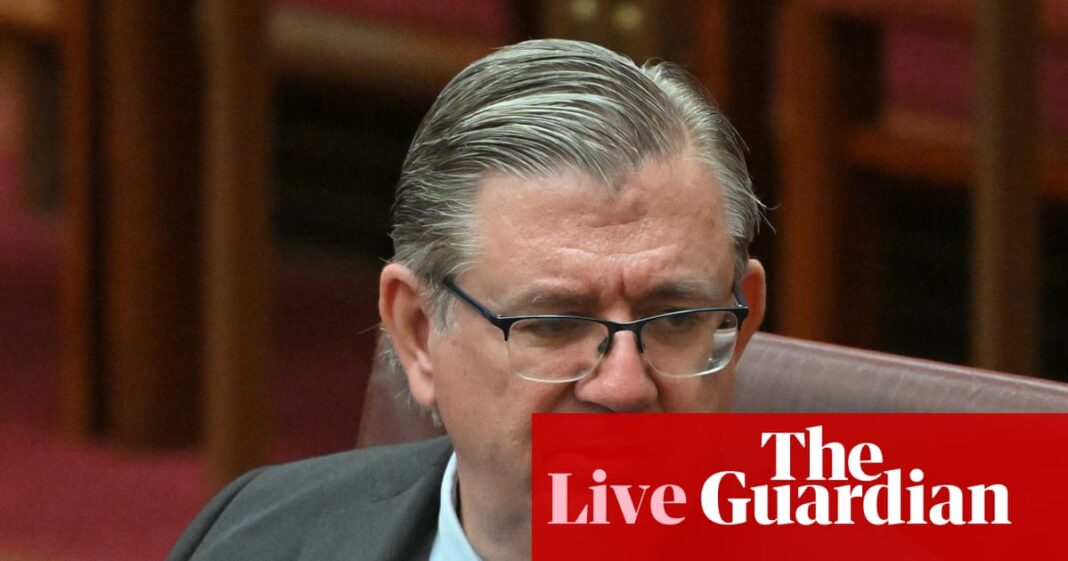Liberal senator condemns ‘unacceptable’ targeting of Indian Australians ahead of anti-immigration protest
A Liberal senator has spoken out against a planned anti-immigration protest this Sunday.
Paul Scarr, a Queensland senator, addressed parliament last night, condemning the March for Australia rallies that will take place across the country. There are nine planned protests.
The flyers accuse Labor and the Liberals of being “complicit” in mass migration, and singles out an increase in migration from India. Scarr told parliament he stands in solidarity with the Indian community in Australia:
I am compelled to rise in this place at the earliest opportunity to call it out and to condemn it and say that the language and references to Australians of Indian heritage is unacceptable. It is outrageous … it seeks to divide Australians at a time when we need to unite.
Key events
Ben Doherty
Continuing from our last post…
If Aukus was successfully implemented, it would “strengthen its closest allies, send a powerful deterrent message to Beijing, and help stabilise the region,” the CSIS report argues.
However, if it was scrapped, Denmark and Edel argue, the US would:
Become less capable in the Indo-Pacific, its defence posture and diplomatic presence would become less deeply embedded, its international credibility would be dramatically undercut, deterrence would be undermined, and propaganda from Beijing and Moscow declaring the unreliability of American commitments would gain significant credibility”.
One of the key issues of Aukus Pillar One centres on the “sovereignty” Australia would hold over any nuclear submarines.
The CSIS report argues the two countries should undertake “contingency planning” to establish how, and under what conditions, Australia’s nuclear-powered submarines would be deployed in a conflict in the region.
Planning, in which military strategists from the United States and Australia would jointly undergo a comprehensive process of strategising and organising military operations to achieve specific objectives, would provide US officials with more concrete reassurances that submarines sold to Australia would not disappear if and when needed.

Ben Doherty
A former senior Pentagon official has urged the US not to abandon the Aukus pact, saying that would make the US “less capable” across the Pacific, but said Australia should give Washington more “concrete” commitments on how it would deploy its nuclear submarines in the event of war in the region.
US think tank the Centre for Strategic and International Studies (CSIS), has published the report, written by Abraham Denmark — an Aukus advisor to former US defense secretary Lloyd Austin — and Charles Edel – CSIS’s Australia chair – as Australian defence minister Richard Marles arrives in Washington DC for a series of meetings with Trump administration officials.
The CSIS report argues Aukus is a “strategic imperative” for all three nations involved – the US, the UK and Australia – but the deal is at a “critical juncture”.
Aukus is currently being reviewed by a senior Trump administration Pentagon official, Elbridge Colby, an avowed Aukus sceptic.
Pillar One of Aukus will provide Australia with conventionally armed, nuclear-powered submarines, while Pillar Two will focus on cooperation between the three militaries in developing new technologies, particularly in AI, quantum technologies, and undersea, hypersonic and electronic warfare capabilities.

Tom McIlroy
Richard Marles to meet JD Vance and Marco Rubio in Washington DC this week
Richard Marles, the defence minister, will meet the US vice-president, JD Vance, and the secretary of state, Marco Rubio, during his trip to Washington this week.
Stephen Miller, a close adviser to the US president, Donald Trump, will also meet Marles.
Marles is still yet to confirm a meeting with US defence secretary, Pete Hegseth, where the Aukus submarine agreement is due to be discussed.
Marles has met with defence industry companies including Austal USA, Northrop Grumman, L3Harris, General Dynamics, Boeing Defense and Anduril.
Labor wants the respective industrial bases of the US and Australia to become increasingly seamless.

Andrew Messenger
Queensland’s victims commissioner quits after damning report
Queensland’s victims commissioner has stepped down, after government released a damning report into an organisation she previously managed.
Beck O’Connor was appointed in the role last year to represent victims of crime and make recommendations to government.
On Tuesday, the minister for victim support, Laura Gerber, announced in parliament that she had resigned, effective 23 September.
In her time in the role, Ms O’Connor has raised awareness of victims’ rights and ensured victims of crime have had a priority voice at the table. The Crisafulli government is committed to putting victims of crime first.
The office of the victims’ commissioner is critical to identifying systemic issues relating to victims and promoting and advocating for the rights of victims.
Acting arrangements will be in place to ensure continuity of important work from the office of the victims’ commissioner until a new appointment is made.
O’Connor was CEO of helpline service DVConnect during a period when the government alleges, thousands of phone calls went unanswered.
Send your political questions to the Back to Back Barries podcast
In the wake of parliament resuming this week, do you have any burning political questions?
Back to Back Barries is Guardian Australia’s political analysis podcast. Each week veteran journalist Barrie Cassidy joins former Liberal adviser and pollster Tony Barry to pull apart the strategies behind the politics.
And they want to hear from you. Send your politics questions to backtobackbarries@theguardian.com and they’ll pick some to answer on this week’s episode, out this Saturday.
Israel’s attack on Gaza hospital ‘horrific’, Wong says
Israel’s strike on a hospital overnight is “horrific”, says foreign affairs minister Penny Wong.
The strikes killed at least 20 Palestinians including five journalists, according to health officials.
Speaking to Channel 7, Wong said the Netanyahu government must agree to a ceasefire.
What we’ve seen overnight with the attack on a hospital is horrific, and what we would say to prime minister Netanyahu is you should heed the call of the world and agree to a ceasefire.
You should take the advice of your own military and agree to a ceasefire.
Cabinet minister Murray Watt told the ABC this morning the strikes were an “outrage” and a “breach of international law”.

Tom McIlroy
Greens urge Labor to come clean on fossil fuel donations
The Greens want Labor to explain how much the party has banked in political donations from fossil fuel companies ahead of the government announcing Australia’s 2035 emissions reduction targets, due between now and September.
The Greens leader, Larissa Waters, said in the most recent data made public, Labor had received about $800,000 from resources companies, including in cash, subscriptions and tickets to party events.
But donations data for the 2024–25 financial year, including contributions ahead of the 3 May federal election, won’t be made public until next February. That is due to the reporting lag under election law in Australia.
Waters says we should know the total amount received before the new target is announced.
If Labor wants to show genuine climate leadership, it must open its books now, not bury this information until 2026, otherwise Australians will rightly question who is pulling the strings.
When coal and gas corporations pour big money into politics, they’re effectively given a pen to write our climate and environmental laws. That’s not democracy, that’s capture.
Real climate action should be for people and [the] planet, not private profits.
Business group urges Labor to commit to ambitious 75% emissions target
350 businesses are piling pressure on the government to go hard with their 2035 emissions reduction target, signing an open letter calling on Labor to commit to a 75% target.
The Business for 75 group includes Fortescue, Atlassian, Canva and Ikea. Their open letter comes with new analysis from Deloitte, showing a 75% target could bring with it an increase in Australia’s GDP by $370bn by 2035.
Labor is waiting for the Climate Change Authority to advise on a 2035 target. Last year, the CCA consulted industry and climate groups on a potential target in the range of 65 to 75% emissions reduction on 2005 levels.
The new Deloitte analysis says a 75% target would bring forward investment of up to an additional $20bn a year to 2035 compared to a 65% target, and would increase Australia’s competitiveness overseas. Deloitte Access Economics’ lead partner, Pradeep Philip, says:
Getting these foundations right with a 75% target can drive, in today’s dollars, $190bn more exports by mid-century.
Liberal senator condemns ‘unacceptable’ targeting of Indian Australians ahead of anti-immigration protest
A Liberal senator has spoken out against a planned anti-immigration protest this Sunday.
Paul Scarr, a Queensland senator, addressed parliament last night, condemning the March for Australia rallies that will take place across the country. There are nine planned protests.
The flyers accuse Labor and the Liberals of being “complicit” in mass migration, and singles out an increase in migration from India. Scarr told parliament he stands in solidarity with the Indian community in Australia:
I am compelled to rise in this place at the earliest opportunity to call it out and to condemn it and say that the language and references to Australians of Indian heritage is unacceptable. It is outrageous … it seeks to divide Australians at a time when we need to unite.

Luca Ittimani
Fewer children attending childcare provider G8, but company posts $22m profit
Childcare giant G8 Education has seen profits pick up despite fewer children attending its centres, which it has blamed on cost-of-living pressures rather than child safety issues across the sector.
Fewer families took up childcare spots across the company’s 399 centres in the first half of 2025 than the same period in 2024, the centre said. Children also attended slightly less frequently, which combined saw revenue slip to $465.4m but also brought down costs, meaning profits soared to $22.5m.
But customer satisfaction was the more important measure, if the comments from G8’s chief executive, Pejman Okhovat, were anything to go by. He started his remarks addressing the sector’s child abuse crisis that has seen governments rush to tighten regulation, saying in a statement:
We recognise that safeguarding children is not just a regulatory obligation, it is an ethical and social licence imperative.
Okhovat said satisfaction and employee retention were on the rise while family inquiries for places had remained stable compared to 2024. He told investors some families were delaying starting their children at a centre early in the year.
Family satisfaction slipped slightly in April but rose again by May. G8’s annual report, released this morning, read:
[The] impact of [the] Victorian incident on occupancy is localised to the impacted centres thus far, and we are not seeing wider trends across the state or the network.
The chief executive also highlighted that 93.7% of G8’s centres had been rated as “exceeding” or “meeting” the national quality standard, which is above average. But that implies 25 centres have not achieved either rating, with a further two yet to be rated.

